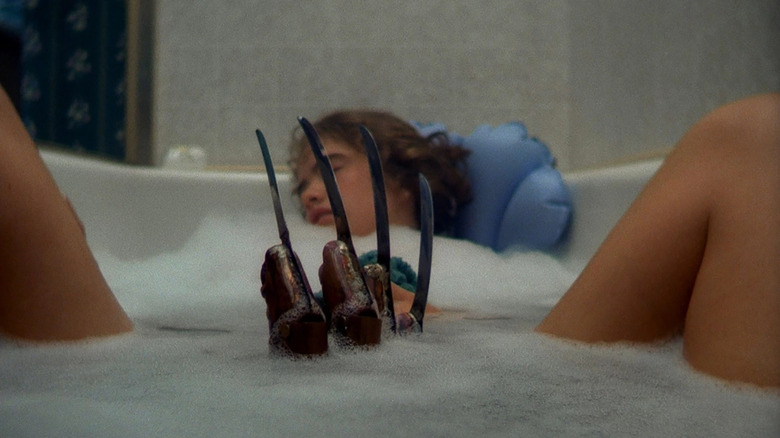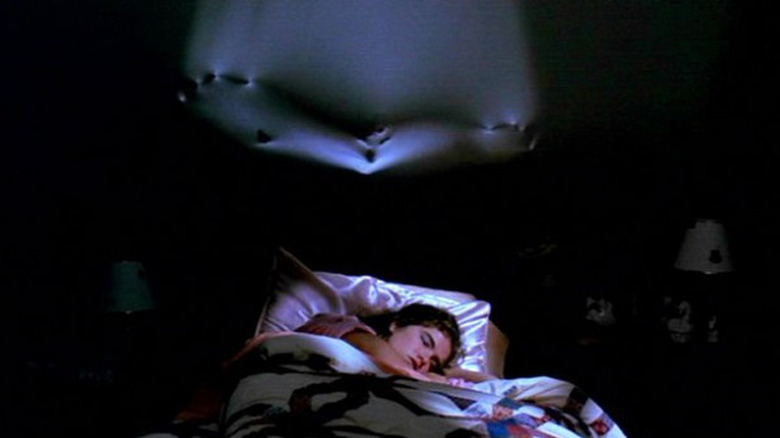40 Years Later, A Nightmare On Elm Street Stars Know Why The Movie Became A Horror Classic [Exclusive]
We may receive a commission on purchases made from links.
Wes Craven's "A Nightmare on Elm Street" turns 40 this year, and Freddy Krueger's popularity doesn't seem to show any signs of stopping. The now iconic slasher birthed a beloved horror franchise and turned stars Robert Englund and Heather Langenkamp into treasured fixtures of the genre. I spoke with Robert Englund last year about his career, so when I was given the chance to interview him and Langenkamp in honor of the film's anniversary, instead of asking him about Freddy Krueger again, I asked Heather Langenkamp to give her feelings on "the bastard son of 100 maniacs" and Englund to give his thoughts on Nancy Thompson.
"Freddy is such a great slasher because he occupies our dreams, yet every detail of his existence — his walk, his talk, his costume, everything — is actually purely frightening and it just reinforces all the work that Robert did to make that a memorable character," Lagenkamp explained. "The seriousness that he approached the character really transcends, I think, every other horror movie monster ever, and I think it's sheerly from his own effort and from the amount of love — weird word to use — but the love that he had for the acting project that was creating Freddy Krueger."
As for proactive final girl Nancy Thompson, Englund credits the fact "she's inhabited by Heather," and the actress's performance makes Nancy a character worth rooting for. "I think that Heather definitely picked up the baton from Sigourney Weaver and Jamie Lee Curtis, and then elevated it to a more strategic and stubborn final girl," he said. And while slasher films certainly weren't novel at the time of the film's release, both stars could tell from the very beginning that there was something special about "A Nightmare on Elm Street," and that this film wasn't going to be relegated to the discount bin at the local Mom & Pop video store.
Wes Craven's vision made A Nightmare on Elm Street into a classic horror movie
Langenkamp told me the cast often got a chance to watch the dailies of the shoots from the day before during lunchtime during production, and were in awe of how beautiful the movie looked even from raw footage. "There's this just dreamlike magic quality of every frame," she said. "I knew the movie was going to be incredibly beautiful, but also weird." She explains that every frame of the film has something just a little bit weird or not "in reality" hiding somewhere, so she "was aware right away that it wasn't just a John Hughes teenage movie about these teenagers trying to fight Freddy off." Englund agreed and said there must have been "some code" between Wes Craven and all of the production designers because the director's vision was so clearly executed.
Unlike many of the slasher films that came before, "A Nightmare on Elm Street" is incredibly vibrant in its coloring, but those subtle tweaks that subconsciously throw the viewer off-kilter are everywhere. "Sometimes door frames were a little smaller to force the perspective or a little bit askew and that just kept you off balance," said Englund. "And it aided this sort of wonderful gimmick throughout the first 'Nightmare' films: When does the nightmare actually begin?"
That nightmare was achieved with truly remarkable practical effects that still hold up four decades later. "This is still the time of John Carpenter's 'The Thing' and the 'A Nightmare on Elm Street' franchise," Englund praised. He told me that while selective CGI is all well and good, there's something lost when films rely too much on CGI: "You're not as engaged because it's not as real." The winning combination of a stellar slasher, a killer final girl, special effects designer Jim Doyle's brilliance, and the genius of Wes Craven helped guarantee that "A Nightmare on Elm Street" would be so much more than a sleeper hit. Listen to my full interview with Englund and Lagenkamp below:
"A Nightmare on Elm Street" is now available for the first time on 4K, which you can purchase here.

